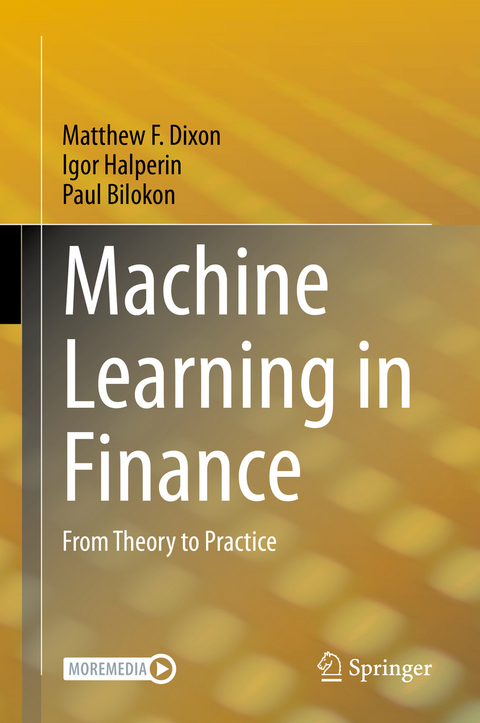
Machine Learning in Finance
Springer International Publishing (Verlag)
978-3-030-41067-4 (ISBN)
This book introduces machine learning methods in finance. It presents a unified treatment of machine learning and various statistical and computational disciplines in quantitative finance, such as financial econometrics and discrete time stochastic control, with an emphasis on how theory and hypothesis tests inform the choice of algorithm for financial data modeling and decision making. With the trend towards increasing computational resources and larger datasets, machine learning has grown into an important skillset for the finance industry. This book is written for advanced graduate students and academics in financial econometrics, mathematical finance and applied statistics, in addition to quants and data scientists in the field of quantitative finance.
Machine Learning in Finance: From Theory to Practice is divided into three parts, each part covering theory and applications. The first presents supervised learning for cross-sectional data from both a Bayesianand frequentist perspective. The more advanced material places a firm emphasis on neural networks, including deep learning, as well as Gaussian processes, with examples in investment management and derivative modeling. The second part presents supervised learning for time series data, arguably the most common data type used in finance with examples in trading, stochastic volatility and fixed income modeling. Finally, the third part presents reinforcement learning and its applications in trading, investment and wealth management. Python code examples are provided to support the readers' understanding of the methodologies and applications. The book also includes more than 80 mathematical and programming exercises, with worked solutions available to instructors. As a bridge to research in this emergent field, the final chapter presents the frontiers of machine learning in finance from a researcher's perspective, highlighting how many well-known concepts in statistical physics are likelyto emerge as important methodologies for machine learning in finance.
Paul Bilokon, Ph.D., is CEO and Founder of Thalesians Ltd. Paul has made contributions to mathematical logic, domain theory, and stochastic filtering theory, and, with Abbas Edalat, has published a prestigious LICS paper. He is a Member of British Computer Society, Institution of Engineering and and European Complex Systems Society. Matthew Dixon, FRM, Ph.D., is an Assistant Professor of Applied Math at the Illinois Institute of Technology and an Affiliate of the Stuart School of Business. He has published over 20 peer reviewed publications on machine learning and quant finance and has been cited in Bloomberg Markets and the Financial Times as an AI in fintech expert. He is Deputy Editor of the Journal of Machine Learning in Finance, Associate Editor of the AIMS Journal on Dynamics and Games, and is a member of the Advisory Board of the CFA Quantitative Investing Group. Igor Halperin, Ph.D., is a Research Professor in Financial Engineering at NYU, and an AI Research associate at Fidelity Investments. Igor has published 50 scientific articles in machine learning, quantitative finance and theoretic physics. Prior to joining the financial industry, he held postdoctoral positions in theoretical physics at the Technion and the University of British Columbia.
Chapter 1. Introduction.- Chapter 2. Probabilistic Modeling.- Chapter 3. Bayesian Regression & Gaussian Processes.- Chapter 4. Feed Forward Neural Networks.- Chapter 5. Interpretability.- Chapter 6. Sequence Modeling.- Chapter 7. Probabilistic Sequence Modeling.- Chapter 8. Advanced Neural Networks.- Chapter 9. Introduction to Reinforcement learning.- Chapter 10. Applications of Reinforcement Learning.- Chapter 11. Inverse Reinforcement Learning and Imitation Learning.- Chapter 12. Frontiers of Machine Learning and Finance.
"This book is, however, a well-structured and self-contained graduate textbook on ML applications in finance. Exercises and some applications are included at the end of each chapter and the Python code used in this book makes use of the Python Tensor Flow library. This book could also serve as a useful reference book for researchers and practitioners in quantitative finance." (Gilles Teyssière, Mathematical Reviews, February, 2023)
"Each part is introduced with background information, examples of relevant practical applications, and references to the most recent scientific literature. ... The book covers all essential areas of machine learning with relevance to quantitative finance. ... An additional strong advantage of this book is the clear and consistent structure of its chapters. ... Overall, the book covers multiple machine learning approaches with advanced technical exposition and is therefore especially suitable as an academic reference point, especially on Reinforcement Learning." (Antoniya Shivarova, Financial Markets and Portfolio Management, Issue 35, 2021)
"This volume aims to present a broad yet technical treatment of (ML) algorithms used by financial practitioners and scholars alike. ... the book fills a large void. ... This encourages reproducibility as well as learning by doing, which is highly appreciated." (Guillaume Coqueret, Quantitative Finance, October 15, 2020)
| Erscheinungsdatum | 03.07.2020 |
|---|---|
| Zusatzinfo | XXV, 548 p. 97 illus., 83 illus. in color. |
| Verlagsort | Cham |
| Sprache | englisch |
| Maße | 155 x 235 mm |
| Gewicht | 1021 g |
| Themenwelt | Mathematik / Informatik ► Mathematik ► Angewandte Mathematik |
| Mathematik / Informatik ► Mathematik ► Finanz- / Wirtschaftsmathematik | |
| Mathematik / Informatik ► Mathematik ► Wahrscheinlichkeit / Kombinatorik | |
| Wirtschaft ► Allgemeines / Lexika | |
| Wirtschaft ► Betriebswirtschaft / Management | |
| Schlagworte | bayesian neural networks • Financial Econometrics • Financial Mathematics • Investment Management • machine learning • Neural networks • Reinforcement Learning • Time Series Modeling • Wealth Management |
| ISBN-10 | 3-030-41067-6 / 3030410676 |
| ISBN-13 | 978-3-030-41067-4 / 9783030410674 |
| Zustand | Neuware |
| Informationen gemäß Produktsicherheitsverordnung (GPSR) | |
| Haben Sie eine Frage zum Produkt? |
aus dem Bereich


